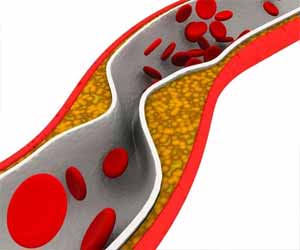- Home
- Editorial
- News
- Practice Guidelines
- Anesthesiology Guidelines
- Cancer Guidelines
- Cardiac Sciences Guidelines
- Critical Care Guidelines
- Dentistry Guidelines
- Dermatology Guidelines
- Diabetes and Endo Guidelines
- Diagnostics Guidelines
- ENT Guidelines
- Featured Practice Guidelines
- Gastroenterology Guidelines
- Geriatrics Guidelines
- Medicine Guidelines
- Nephrology Guidelines
- Neurosciences Guidelines
- Obs and Gynae Guidelines
- Ophthalmology Guidelines
- Orthopaedics Guidelines
- Paediatrics Guidelines
- Psychiatry Guidelines
- Pulmonology Guidelines
- Radiology Guidelines
- Surgery Guidelines
- Urology Guidelines
Icosapent ethyl slows progression of atherosclerosis significantly: EVAPORATE trial

Icosapent ethyl added to statin therapy in patients with elevated triglycerides (TGs) significantly slowed coronary atherosclerosis progression.
USA: Substantiating findings from the REDUCE-IT trial, interim results from EVAPORATE trial suggest that icosapent ethyl 4 g/day reduced total plaque volume but did not reduce low attenuation plaque volume compared to placebo, in patients with angiographic coronary artery disease on statins with elevated triglycerides. The plaque volume was assessed by coronary CTA (computed tomography angiogram).
The results were presented at the American Heart Association's Scientific Sessions on November 18, 2019.
Statin therapy alone helped in the reduction of cardiovascular events and the slowing of coronary atherosclerosis progression but significant cardiovascular (CV) risk remains. In the REDUCE-IT study, Icosapent ethyl (IPE) added to statin was shown to reduce initial CV events by 25% and total CV events by 30%.
The current trial by Matthew J Budoff, Lundquist Inst and UCLA Sch of Med, Torrance, CA, and colleagues aimed to determine whether the addition of IPE 4g/d will result in a greater change from baseline in plaque volume measured by serial multidetector computed tomography (MDCT) than placebo in statin-treated patients.
"EVAPORATE is the first study using MDCT to evaluate the effects of IPE as an adjunct to statin therapy on plaque characteristics in a high-risk CV risk population with persistently high TG levels," wrote the authors.
EVAPORATE is a randomized, double-blind, placebo-controlled trial. The trial enrolled 80 patients who met the inclusion criteria: 1) 30-85 years of age; 2) Triglycerides: 135-499 mg/dl; 3) Low-density lipoprotein cholesterol >40 mg/dl and ≤115 mg/dl (on statin); 4) ≥1 angiographic stenosis with ≥20% narrowing by computed tomography angiography (CTA); and 5) No history of myocardial infarction, stroke, or life-threatening arrhythmia within the prior 6 months and no history of coronary artery bypass grafting
Patients underwent an interim scan at 9 months and are currently being followed for an additional 9 months with MDCT at 0, 9 and 18 months. Eligible patients were randomized in a 1:1 fashion to either icosapent ethyl 4 g/day (n = 40) or placebo (n = 40).
67 completed the 9-month visit and had interpretable MDCT at baseline and at 9-months (age=57±6 years, male=36).
Read Also: Novel MRI protocol detects Coronary Artery Disease in 15 minutes: JACC
Key findings of the study include:
- At the 9-month interim analysis, there was no significant change in low attenuation plaque between active and placebo groups (74% vs 94%).
- There was slowing of total non-calcified plaque (sum of LAP, fibrofatty, and fibrous plaque) (35% v. 43%), total plaque (non-calcified + calcified plaque, fibrous plaque (15% v. 26%) and calcified plaque (-1% v. 9%), after adjustment by baseline plaque, age, sex, diabetes status, baseline triglyceride levels, and statin use.
Read Also: CT Coronary Artery Calcium- Useful tool to predict future risks of heart attack and stroke in young
Icosapent ethyl is currently US Food and Drug Administration-approved with an indication for reducing triglyceride levels in adult patients with severe (≥ 500 mg/dL) hypertriglyceridemia.
"These are interim results; the planned duration of follow-up is 18 months. These results may help explain the cardiovascular benefit noted with icosapent ethyl in the REDUCE-IT trial," wrote the authors.
The study, "Effect of Icosapent Ethyl on Progression of Coronary Atherosclerosis in Patients With Elevated Triglycerides (200-499mg/dl) on Statin Therapy (EVAPORATE Study)," was presented on November 18, 2019, at the AHA meeting.

Disclaimer: This site is primarily intended for healthcare professionals. Any content/information on this website does not replace the advice of medical and/or health professionals and should not be construed as medical/diagnostic advice/endorsement or prescription. Use of this site is subject to our terms of use, privacy policy, advertisement policy. © 2020 Minerva Medical Treatment Pvt Ltd